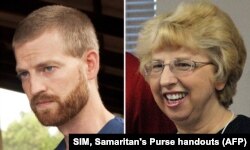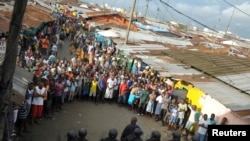U.S. aid workers Dr. Kent Brantly and Nancy Writebol have been discharged from Emory University Hospital in Atlanta after recovering from Ebola and testing clear of the virus, officials said on Thursday.
Writebol, 59, was released Tuesday, and her husband, David, said in a statement emailed by the aid group SIM that that she is free of the virus but is in a weakened condition. She is recuperating at an undisclosed location.
Writebol had asked that her discharge remain private.
Brantly, 33, who was flown to Atlanta on Aug. 2, said “today is a miraculous day” at a news conference as he was released from Emory on Thursday.
"I am forever thankful to God for sparing my life," he said.
No sign of virus
Dr. Bruce Ribner, medical director of Emory's Infectious Disease Unit, said both Brantly and Writebol were discharged after blood tests showed no evidence of the virus and eased symptoms.
The two aid workers were treated for nearly three weeks at the Atlanta hospital.
Ribner said they are both likely to make a complete recovery, adding, "The discharge from the hospital of both these patients poses no public health threat."
Ribner said the two were released in consultation with the U.S. Centers for Disease Control and Prevention.
“To the extent that we've tested, there is no evidence of Ebola virus in their bodies,” Ribner said.
He said the limited knowledge of the Ebola virus "especially in our country – has created understandable anxiety and fear for some persons."
"We understand there are a lot of questions and concerns regarding Ebola, but we cannot let our fears dictate our actions. We must all care," he said.
Experimental drug
Ribner said the two will have follow-up care, "much like anyone who has been in intensive care."
When asked how much the hospital spent on the care for Brantly and Writebol, he answered, "I have no clue."
The two were infected while working at a missionary clinic outside Liberia's capital. Emory Hospital is where Brantly and Writebol received treatment that included the experimental drug ZMapp.
Ribner had said that these two were the very first to receive the treatment and doctors do not know whether it helped them, it had no effect or "theoretically delayed their recovery."
Brantly, while in Liberia, also received a blood transfusion from a teenager who had survived Ebola.
When asked how this transfusion might have helped Brantly, Ribner said, "We have no idea how, if at all, that impacted his outcome."
Liberia has been hardest hit by the worst-ever outbreak of the disease.
The World Health Organization says 1,350 people have died in West Africa, with 576 of the deaths coming from Liberia.
Some information for this report provided by Reuters and AP.







